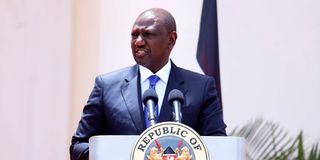On the horns of a drought dilemma

President William Ruto. As a gimmick to win last year’s election, Kenya Kwanza government’s “bottom-up” development hoax worked well, but after victory, the reality has begun to sink in among the hordes that thronged the voting booths chanting sipangwingi that there never was anything like free lunch.
What you need to know:
- It is in the nature of politics for office-seekers to promise the unrealistic, make it sound reasonable, and then when in power, refuse to acknowledge responsibility for what went wrong, instead apportioning blame to scapegoats.
- That seems to be what happened to the Kenya Kwanza government’s “bottom-up” development hoax conceived by a clique of political economy theorists.
- The idea sounded brilliant on the campaign trail but it has proved to be quite divorced from the truth.
The situation is dire; the outlook forlorn. The future looks bleak for millions of Kenyans who are facing disaster, for great hunger looms at a time when most of them barely eke out a living scratching the earth to grow enough food to eat.
The sun has been merciless these past two months and the crops in the field have already shrivelled and died before maturity for the short rains have failed again this season. Many Kenyans who don’t live in the arid lands had no idea what scorched earth really looks like, but now they do.
At a time when food inflation is at its height, suddenly, there is nothing growing in the fields and nothing stored in the granaries.
This is especially worse in areas that have always been food sufficient; they have all, uniformly, been hit by a devastating drought and the chances of any timely recovery are dwindling with each passing day as the sun rises with a vengeance early every morning.
It is heart-rending to see peasant farmers trudging to their small plots, sweating profusely at 7 am on a mission to rescue sapless maize stalks so that the cows can at least eat.
Unfortunately, the government’s priorities are not very helpful in this regard, consisting, as they do, of taxing everyone harshly to repay debts incurred to build impressive but costly infrastructure projects, removing subsidies which, at least, helped cushion Kenyans from the harsh realities of life—some say for too long — and selling off failing quasi-government corporations to local oligarchs to raise money, ostensibly for the public purse.
This last is, unfortunately, causing jitters because such sales are usually shrouded in mystery, and by the time the details come to light, it is usually too late for the general public to know the eventual beneficiaries.
Adding to the litany of lopsided priorities is the need to forestall potential political turmoil brought about by unfulfilled expectations born of extravagant campaign promises. This, quite understandably, is another area that must, of necessity, preoccupy many in government, because it makes the regime vulnerable.
It is in the nature of politics for office-seekers to promise the unrealistic, make it sound reasonable, and then when in power, refuse to acknowledge responsibility for what went wrong, instead apportioning blame to scapegoats.
As former President Moi once pithily observed, politics is the art of seduction. To win a girl, you can promise her anything. Once she is in the box, you do not have to work too hard trying to impress her; you can always tell her “it is what it is” and that is it.
No free lunch
That seems to be what happened to the Kenya Kwanza government’s “bottom-up” development hoax conceived by a clique of political economy theorists. The idea sounded brilliant on the campaign trail but it has proved to be quite divorced from the truth.
As a gimmick to win last year’s election, it worked well, but after victory, the reality has begun to sink in among the hordes that thronged the voting booths chanting sipangwingi that there never was anything like free lunch.
However, to be fair, nobody could have foretold that the rains would be virtually non-existent, or that food shortages would be so widespread. The new government never counted on drought derailing its programmes but it did promise to lower the cost of unga by 100 per cent which was rather rash.
Reality has a way of deflating human presumptions, and this is one such case. What should have been foreseen was that other factors would impact the availability and prices of food and fuel. Indeed, that became a campaign tool with which to bash the outgoing Jubilee government. So what should the government do in these circumstances?
It can do one of three things: Continue providing food aid to the most vulnerable hoping that things will improve on their own once it rains, reintroduce fuel and electricity subsidies and by so doing lose face while annoying the multilateral lenders, or strike a balance between the two while cushioning ordinary folks who are really hurting.
What it shouldn’t do is seek to rectify this sorry state of affairs by imposing tax on everything. High taxes are low-lying fruits but they can be terribly counter-productive. At the same time, I agree with what it is saying though I disagree with the timing and all the noise: Everyone must pay tax.
* * * *
One clear sign that seniority is fast approaching is the inability to comprehend a new language which is upon us. Of late, I have stumbled upon terms that are literally Greek to me. One of them is the strange lingo, “metaverse”, which I thought had something to do with poetry. It turns out that this is not the case.
And then there is this thing, “chatGPT”, which somehow reminds me of pyramids and pharaohs of old.
Even the usually reliable Google couldn’t help. In short, the so-called Artificial Intelligence is making me feel downright unintelligent. Could the more techno-savvy scribes please unravel these mysteries for the rest of us—in English, if possible?
Mr Ngwiri is a consultant editor; [email protected]





